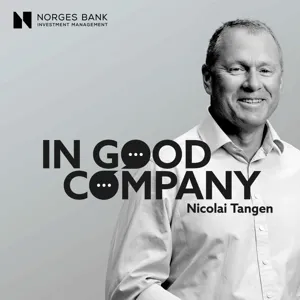New Emissions Rules Could Spell the End of U.S. Coal Plants

Explore "energytransition" with insightful episodes like "New Emissions Rules Could Spell the End of U.S. Coal Plants", "Shell CEO: Energy, security, transition, and Leadership", "The Intelligence: Life inside a Russian prison", "Is Chris Christie A Man Without A Party?" and "When Great Power Conflict and Climate Action Collide" from podcasts like ""WSJ What’s News", "In Good Company with Nicolai Tangen", "Economist Podcasts", "The NPR Politics Podcast" and "The Ezra Klein Show"" and more!


Wael Sawan is a Lebanese Canadian business executive who became CEO of Shell in 2023. He shares unique insights into navigating the complex landscape of energy transition, aiming for sustainability while meeting global energy demands. In this episode, Wael also shares his personal story and advice to young people.
The production team for this episode includes PLAN-B's Pål Huuse and Niklas Figenschau Johansen. Background research was conducted by Kristian Haga and Isabelle Karlsson, with input from portfolio manager Ståle Lægreid.
Hosted on Acast. See acast.com/privacy for more information.

Alexei Navalny was sent to one to die and American journalist Evan Gershkovich is being held in another. Our correspondent reports on the notorious brutality of Russia’s prisons. Without the right policies, undoing years of dependency on oil will take much longer than hoped (11:03). And a tribute to the Israeli luthier who restored violins from the Holocaust (18:53).
Listen to what matters most, from global politics and business to science and technology—Subscribe to Economist Podcasts+
For more information about how to access Economist Podcasts+, please visit our FAQs page or watch our video explaining how to link your account.
Hosted on Acast. See acast.com/privacy for more information.


The global decarbonization effort is colliding headfirst with the realities of great power politics. China currently controls more than 75 percent of the world’s electric vehicle battery and solar photovoltaic manufacturing supply chains. It also processes the bulk of the so-called critical minerals, like lithium, cobalt and graphite, that are essential to building out clean energy technologies. There is no clean energy revolution without China.
What would happen if China decided to weaponize its clean energy resources in the same way Russia recently weaponized its oil and gas? Is it possible for the U.S. to end its energy dependency on China by investing in clean energy at home? What does this geopolitical reality mean for the prospect of meeting the world’s climate goals?
Over the past few years, Jason Bordoff and Meghan O’Sullivan have been at the forefront of mapping out the ways decarbonization will upend the world’s economic and geopolitical order. Bordoff is the founding director of the Center on Global Energy Policy at Columbia University and a former senior director for energy and climate change for the National Security Council under Barack Obama. O’Sullivan is the director of the Belfer Center for Science and International Affairs at the Harvard Kennedy School and a former deputy national security adviser in the George W. Bush administration.
In Bordoff and O’Sullivan’s view, decarbonization won’t just affect what kinds of cars we drive or how we power our homes. It will transform everything from the nature of international markets and trade relations to the global balance of military and diplomatic power. And it will create new economic superpowers, new alliances and new sources of geopolitical conflict in the process.
This conversation explores the contours of this transformation and what it will mean for the future of the climate and world politics.
Mentioned:
“The Age of Energy Insecurity” by Jason Bordoff and Meghan L. O’Sullivan
“A Critical Minerals Policy for the United States” by Meghan L. O’Sullivan and Jason Bordoff
“Biden’s Historic Climate Bill Needs Smart Foreign Policy” by Jason Bordoff
“The Nuances of Energy Transition Investments” by Columbia Energy Exchange, with Larry Fink
Book Recommendations:
The Prize by Daniel Yergin
Silent Spring Revolution by Douglas Brinkley
The Avoidable War by Kevin Rudd
How to Avoid a Climate Disaster by Bill Gates
This episode is guest-hosted by Rogé Karma, the senior editor for “The Ezra Klein Show.” Rogé has been with the show since July 2019, when it was based at Vox. At Vox, he also wrote and conducted interviews on topics ranging from policing and racial justice to democracy reform and the coronavirus pandemic.
Thoughts? Guest suggestions? Email us at ezrakleinshow@nytimes.com.
You can find transcripts (posted midday) and more episodes of “The Ezra Klein Show” at nytimes.com/ezra-klein-podcast, and you can find Ezra on Twitter @ezraklein. Book recommendations from all our guests are listed at https://www.nytimes.com/article/ezra-klein-show-book-recs.
This episode of “The Ezra Klein Show” was produced by Rogé Karma. Fact checking by Michelle Harris, with Mary Marge Locker and Kate Sinclair. Our senior engineer is Jeff Geld. Our senior editor is Rogé Karma. The show’s production team also includes Emefa Agawu, Rollin Hu and Kristin Lin. Original music by Isaac Jones. Audience strategy by Kristina Samulewski and Shannon Busta. The executive producer of New York Times Opinion Audio is Annie-Rose Strasser. Special thanks to Sonia Herrero.

In the neighbourhood of Whitby in Cheshire, residents had to grapple with a question that many more of us will have to ask in the coming years: how should we heat our homes if we’re no longer allowed gas boilers? What started as a proposal to test hydrogen heating soon escalated into an explosive argument. As government policies aimed at reaching net zero start to affect our daily lives, is it a sign of the squabbles to come?
This podcast was brought to you thanks to the support of readers of The Times and The Sunday Times. Subscribe today: thetimes.co.uk/storiesofourtimes.
Guests:
- Ben Cooke, Times Earth editor.
- Kate Grannell, campaigner.
Host: Luke Jones.
Clips: Cheshire West and Chester Council, Sky News, The Economist, TED.
Hosted on Acast. See acast.com/privacy for more information.


In this episode, Nicolai Tangen talks to Patrick Pouyanné Chairman and CEO at TotalEnergies, one of the largest energy companies in the world. Nicolai and Patrick discuss net zero, challenges and opportunities in the energy transition and Patrick share some fascinating insight of his past meetings with Vladimir Putin before the invasion.
Unfortunately, we experienced some technical issues during the recording of this episode, which resulted in poor quality of sound. For those that find it hard to follow what is being said, please find a transcript of the entire episode her; Transcript
The production team on this episode was PLAN-B’s Niklas Figenschau Johansen and Martin Oftedal. Background research was done by Sigurd Brekke with additional input from Ståle Lægreid.
Hosted on Acast. See acast.com/privacy for more information.
![The trends shaping the energy transition [partner content]](https://www.podcastworld.io/podcast-images/catalyst-with-shayle-kann-0g3h5pg5.webp)


It was a long-shot bet on liquid natural gas, but it paid off handsomely — and turned the United States into a leading fossil-fuel exporter.
The journalist Jake Bittle delves into the storied career of Charif Souki, the Lebanese American entrepreneur whose aptitude for risk changed the course of the American energy business.
The article outlines how Mr. Souki rose from being a Los Angeles restaurant owner to becoming the co-founder and chief executive of Cheniere Energy, an oil and gas company that specialized in liquefied natural gas, and provides an insight into his thought process: “As Souki sees it,” Mr. Bittle writes, “the need to provide the world with energy in the short term outweighs the long-term demand of acting on carbon emissions.”
In a time of acute climate anxiety, Mr. Souki’s rationale could strike some as outdated, even brazen. The world may be facing energy and climate crises, Mr. Souki told The New York Times, “but one is going to happen this month, and the other one is going to happen in 40 years.”
“If you tell somebody, ‘You are going to run out of electricity this month,’ and then you talk to the same person about what’s going to happen in 40 years,” he said, “they will tell you, ‘What do I care about 40 years from now?’”
This story was written by Jake Bittle and recorded by Audm. To hear more audio stories from publications like The New York Times, download Audm for iPhone or Android.

With energy prices booming, heatwaves ravaging Europe, and Russia going to war against Ukraine, there's an increased focus on the so-called energy transition. Interest in decarbonization is surging. But there's still a lot of ambiguity about what that might look like. As we've learned lately, with booming demand for coal, and many premature obituaries having been written for oil, energy sources don't just disappear easily like how Palm Pilots died after the introduction of the iPhone. In fact, the consumer tech/disruption framework is completely the wrong way to think about it. On this episode of the podcast, we speak with Bob Brackett -- a senior research analyst at Bernstein -- on what so many people get wrong about the energy transition. And what it will look like instead.
See omnystudio.com/listener for privacy information.

Oil prices are sky high. And there's plenty of oil in the ground in North America. And so far the supply response has been disappointing. Frustration is boiling over among drivers and politicians, and it's made life more complicated for the complicated. So what's the hold up? On this episode, we speak to longtime energy investor and industry participant Peter Tertzakian about the reality on the ground. He explains that there are numerous operational factors constraining oil supply, including degraded quality of equipment and a shortage of labor, not to mention a reluctance among investors to splurge on new production. We discuss the specific constraints, as well as what it will take to get supply going on.
See omnystudio.com/listener for privacy information.



The global climate crisis will require us to transform the way we act, says His Holiness Pope Francis. Delivering a visionary TED Talk from Vatican City, the spiritual leader proposes three courses of action to address the world’s growing environmental problems and economic inequalities, illustrating how all of us can work together, across faiths and societies, to protect the Earth and promote the dignity of everyone. “The future is built today,” he says. “And it is not built in isolation, but rather in community and in harmony.”
(In Italian with English voiceover)

Neil deGrasse Tyson looks past politics to examine climate change, clean energy, the future of life on Earth, and spider goats with environmental activist and former Vice President Al Gore, blogger Andrew Revkin, and comic co-host Maeve Higgins.
Stay up to date
For any inquiries, please email us at hello@podcastworld.io